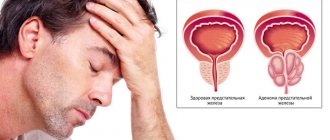Symptoms for which you should consult a pediatric urologist
You can understand about disturbances in the functioning of the genitourinary system by the following symptoms in children:
- Changes in urine composition as a result of routine examinations. With pathologies, its color, smell, and transparency change;
- Lack of urination;
- Rare urination, scanty discharge;
- Incontinence;
- Pain in the kidney area, which may be accompanied by vomiting, diarrhea and bloating.
In addition to the general symptoms, the boy must be urgently shown to a urologist for: swelling of the testicles, redness on the penis, inability to expose the glans.
For girls, consultation with a urologist is important in the absence of menstruation, cycle failure and severe facial hair. During the period of hormonal changes in the body, discharge may appear that has a strong unpleasant odor.
Beginning of puberty
Normally, puberty begins in girls between the ages of 8 and 13
, and
in boys
a little later -
from 9 to 14 years
.
This process is triggered by hormones that are produced in the hypothalamus and pituitary gland: GTRH, LH, FSH. Exactly when a boy or girl begins to grow up is influenced by many factors. Genetics
plays a significant role . If the parents started puberty early, then most likely the child will experience it earlier than other children. And vice versa. Interestingly, this pattern is more often observed among fathers and sons.
— The process of puberty is also influenced by how the pregnancy and childbirth proceeded, whether there were any complications, what medications the mother took during pregnancy and breastfeeding, how the child grew and developed after birth, what illnesses he had, what physical problems he had load, whether he was exposed to stress
.
In general, puberty in modern children occurs a year and a half earlier than in previous generations. The doctor connects this with the harmful factors that our society has encountered, in particular “pseudohormones”
.
— These are chemicals of anthropogenic origin: pesticides, bisphenol A, phthalates, which are contained in food products; used for the production of plastic products, consumer goods, and synthetic detergents. They are “built into” the human body and can lead to various diseases, including disrupting the process of puberty.
The doctor also draws attention to the problem of obesity among modern children. Overweight
negatively affects puberty: it can start too early or, conversely, late. There is another negative point:
- If you are overweight, an imbalance occurs between female and male hormones - estrogens and androgens, and this is fraught with consequences. An excess of male hormones in girls can cause menstrual irregularities.
and excess body hair growth.
Overweight boys may experience a decrease in the amount of male hormones ,
which will slow down the process of puberty.
The opposite situation, when teenagers go on strict diets
.
— Deficiency or sudden weight loss can lead to disruption of puberty. But this affects fertile function, that is, the ability to become parents in the future,” explains the doctor.
Scheduled inspections
The absence of pathologies and suspicious symptoms does not mean that you should postpone a visit to the urologist. Preventive examinations of children are carried out by specialists at 1 year, three years and 7 years.
A visit to a urologist with your baby will allow you to determine malformations of the genital organs at the genetic level. Experts include narrowing of the foreskin, small size of the genitals, and phimosis as such pathologies. The sooner you diagnose and receive useful advice, the greater the likelihood of recovery.
Undescended testicles are a common problem in newborns. Most often, the process is completed within the first three months of the baby’s life. Otherwise, the doctor prescribes conservative treatment.
Phimosis is a pathology in which, due to narrowing of the foreskin, it is not possible to fully open the head of the penis. Many children experience physiological phimosis, which goes away on its own by the age of 3-4 as the boy grows older.
Surgical intervention is required in case of inflammation. You can understand the onset of inflammation by swelling of the foreskin, difficult and painful urination. Self-breeding is unacceptable, as it can lead to trauma to the skin and the appearance of scars on it.
Before attending kindergarten, schools carry out subsequent preventive examinations. During this period, it is important to exclude hernias and dropsy, and to understand that the child’s development corresponds to his age.
Guerrilla infections
— How early do teenagers begin sexual activity, and what health problems arise?
— Boys, like girls, now begin to have sex earlier. This is not a general trend, but compared to 15-20 years ago, this happens 3-5 years earlier, already at the age of 13-14 years.
There is a high probability that a teenager will get sexually transmitted infections. And we must understand that most often they have a hidden course, their symptoms are not expressed, and if not treated, then in adulthood you can also be left without children.
Any redness or discharge should alert you, not to mention difficulty urinating or pain. But more often than not, if these symptoms do not cause any persistent and constant discomfort, then the teenager believes that so be it, that’s how it should be, it’s okay.
Doctor. Robe. Disease
CC0
Or a teenager realizes that something is wrong, but is afraid to see a doctor. Moreover, he is afraid to tell his parents. And then friends can get scared by reading something on the Internet. Then we get serious complications, for example, stricture (narrowing) of the urethra.
If inflammation is not treated in time, the infection progresses further. A bacterium is a partisan who always strives to get deeper into the enemy’s camp. Next will be inflammation of the prostate gland - prostatitis, which threatens chronic urination problems. Weak erection, impaired ejaculation and decreased sensitivity of the head are also possible consequences of infections.
- Are we talking about an adult man now?
— All this, contrary to belief, manifests itself not only in adulthood, but also in adolescence. If a person begins to be sexually active, he has all these risks.
Prostatitis among teenagers could be diagnosed more often, but sometimes they are treated by other specialists under other diagnoses - cystitis (inflammation of the bladder) or pyelonephritis (inflammatory process in the kidneys).
Boy and girl.
Open sources.
Not long ago, a teenager was referred to our nephrologist with severe inflammatory manifestations in the urine. The doctor saw the discrepancy between these manifestations and the patient’s symptoms and general condition and referred him to our department. And we diagnosed him with gonorrhea. So, under the guise of inflammatory diseases, more formidable ones - sexually transmitted diseases - can be hidden.
Reception of patients by a pediatric urologist
A doctor’s consultation begins with collecting the child’s medical history (genetic diseases, past infectious and chronic diseases). Parents must provide the doctor with complete information about the baby’s health so that the urologist, after diagnosis and examination, can prescribe the correct treatment.
The doctor conducts a visual examination of the child’s genitals and palpates the kidneys and abdomen. It is mandatory that a minor patient be examined and consulted in the presence of legal representatives. In some cases, if doubts arise, the doctor prescribes diagnostic measures. Instrumental methods include:
- Ultrasound of the abdominal cavity, pelvis and genital organs;
- X-ray examination;
- Laboratory tests (CBC, OAM, PCR, ELISA);
- Videocystoscopy.
The availability of modern diagnostic equipment in the clinic allows for prompt diagnosis and selection of an individual treatment plan for the patient.
Pediatric urologists resort to various treatment methods. For treatment and quick recovery, children are prescribed drug therapy and physiotherapeutic procedures. Minimally invasive operations are performed by a doctor with minimal trauma according to indications.
Parents should take their children's health seriously and immediately seek advice from a urologist if alarming symptoms occur. Caring for the child’s body and the attentive attitude of parents is the key to good health and a carefree life for little patients.
It hurts - it means it's urgent
— After 14 years of age, teenagers can refuse annual examinations, and, meanwhile, this is the most important time. How to “make” them still come to the doctor?
— In this sense, primary contact is important. If you regularly see a doctor from childhood, you can avoid negative emotions, establish a normal dialogue with the doctor, so that later the teenager is not afraid to seek help on his own and discuss all problems.
Every man should have a specialist with whom he can talk about the health of the reproductive system.
How to prepare a child for a visit to the urologist?
Parents should closely monitor the baby’s health, so if the child begins to complain of discomfort associated with urine output, or if the organs of his genitourinary system have changed in any way (redness, swelling, etc.) - this should be a reason to contact pediatric urologist.
In addition, it is necessary to visit a urologist for preventive purposes - at least once a year. This will detect any abnormalities or disorders at the initial stage and prevent the occurrence of various serious genitourinary diseases in boys or girls.
Many experts are of the opinion that most urological problems arise in the stronger half of humanity due to the fact that they were not taught to visit a specialist. That is why it is worth visiting a urologist regularly, this will allow you to be confident in the child’s health, the absence of problems, and will also teach the boy to visit a doctor.
Hydrocele of the testicle
Previously, doctors began to sound the alarm if a boy’s testicles did not descend into the scrotum after four years. Today they insist that if this has not happened within a year, then it’s time to go to the doctor. The consequences of undescended testicles in a boy - cryptorchidism - can be very serious; if you delay too much in seeking treatment, problems with reproductive function may arise in the future.
There is also a list of problems that relate to the location of the testicles. For example, it happens that a testicle can go into the inguinal canal and get stuck there. The problem will not solve itself, so contacting a urologist is inevitable. If the child is excitable or has neurological problems, the muscle that supports the testicle may suddenly contract, causing it to return from the scrotum into the inguinal canal. The problem can be solved by a urologist non-surgically and quite quickly.
What it is? The problem arises as a result of a defect in intrauterine development. A boy's testicle originates behind the peritoneum near the kidneys. While the baby is still in the womb, it must travel a considerable distance and descend into the scrotum. But since one of the membranes of the testicle is the peritoneal membrane, when the testicle descends, it pulls the peritoneum along with it.
Sometimes, for the same reason, dropsy of the spermatic cord occurs or cysts of the spermatic cord appear.
How often does it occur? In 10% of newborns.
What are the dangers of this condition? With tense dropsy, the testicle is compressed and develops incorrectly. There is an assumption that dropsy can affect reproductive function, but usually no one takes the matter to the point where a man can be convinced that because of dropsy he is infertile. The problem is solved in childhood.
When should parents be wary and show their boy to the doctor? Although a boy is already born with this defect, it becomes visible only at the age of one and a half years. While the child is lying down, the liquid does not drain into the testicular membrane. But when the boy begins to walk, one of his scrotums turns out to be noticeably larger than the other and acquires a bluish tint. This usually frightens parents and they immediately take the baby to the doctor.
By the way, there is also bilateral dropsy, when fluid accumulates in the membranes of both testicles.
The baby is operated on as soon as the diagnosis is made, at one to one and a half years old. The vaginal process is ligated so that fluid no longer flows from the abdominal cavity into the membrane or into certain parts of the spermatic cord. Under general anesthesia. Often in a one-day hospital, and immediately sent home. After a week, the stitches are removed.










